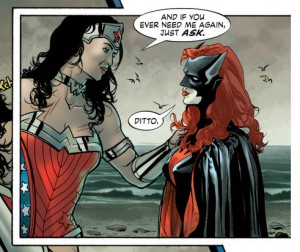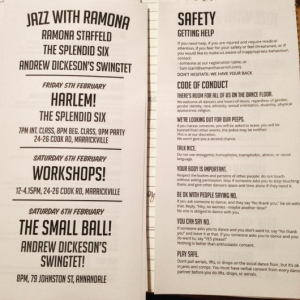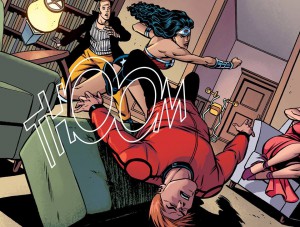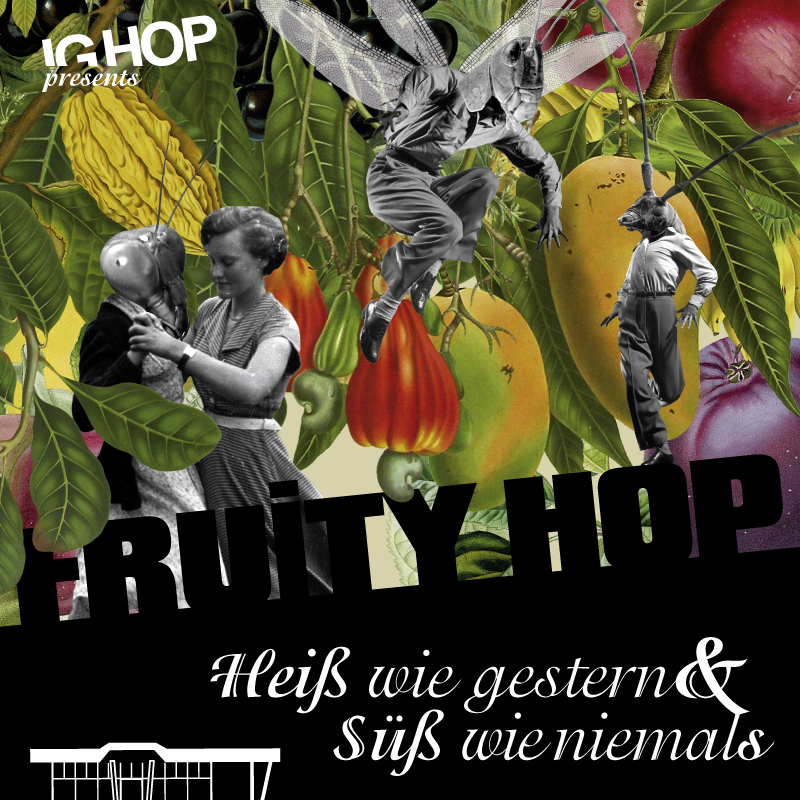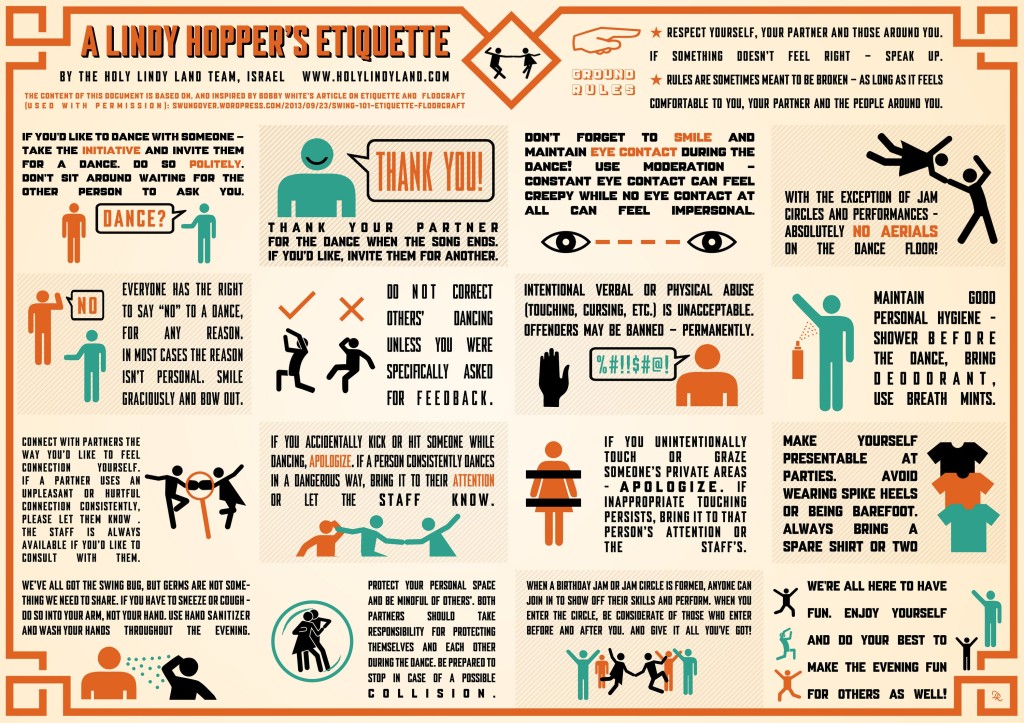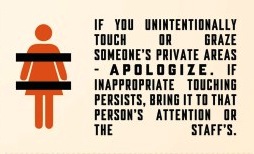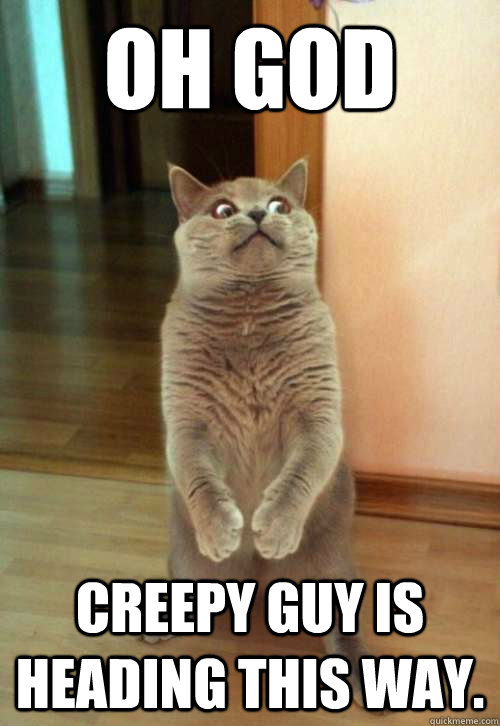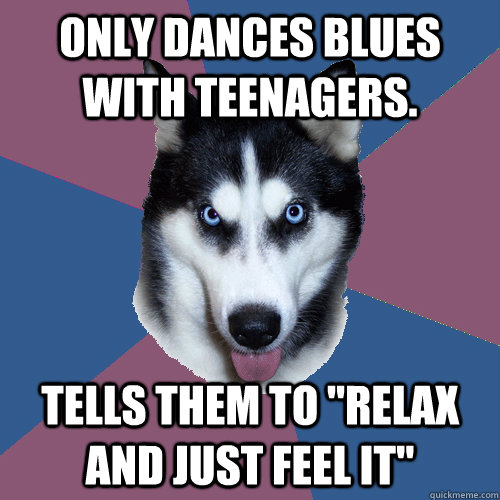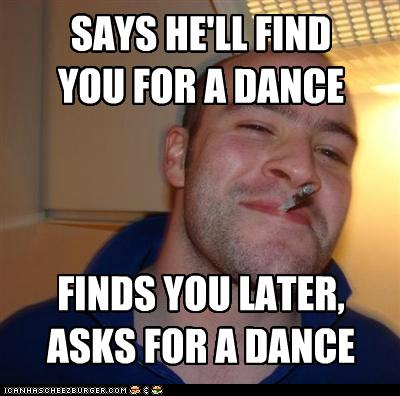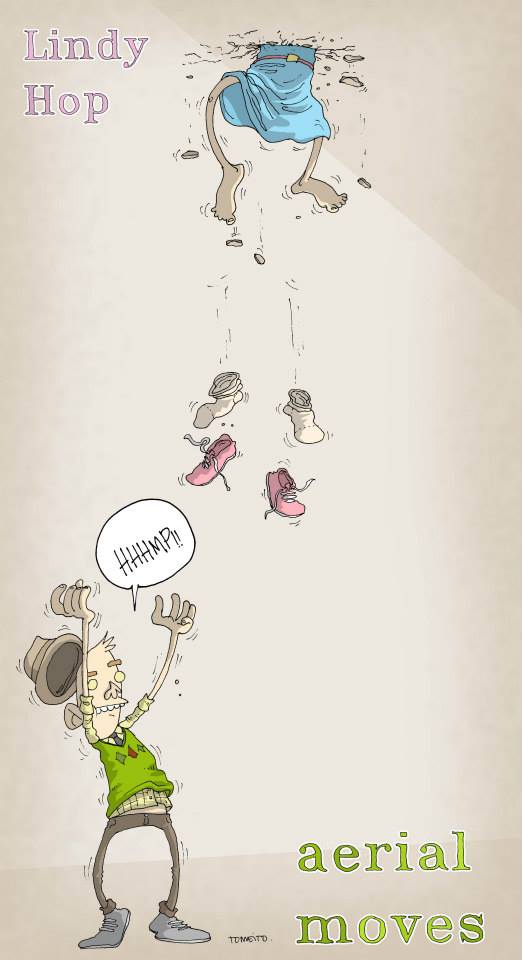As I noted in Polite ladies don’t swear I’m doing a survey of the Australian swing dance events and their codes of conduct. Do they have them? Are they publicly available? Can they be found and read easily?
This post is a very basic, very simple overview.
I ask:
- Does the event have a code of conduct listed on its website?
- Is it available from a link on the main page (it should be), or is it hidden behind a few clicks?
- If the event doesn’t have a code, does its parent organisation?
Of course, having a code is pretty much a token exercise without supporting response strategies, training for all workers, and the code itself being readable, accessible, and available in paper form at the event. It has to be accompanied by in-class teaching and training for cultural change.
So of course, the next step in assessing Australian events would be to assess the in-person responses and processes of each event. So far MLX is winning: I was very impressed by what I saw this year at that event. Hopefully we don’t have to wait until something happens to assess an event’s response strategy.
Why did I do this? Why am I being such a pain? Because I’m a keen social dancer, I’m a DJ, and I go to events. I want to be safe. I want my friends to be safe. As a woman, I experience sexual harassment pretty much every week, and pretty much every time I leave the house. So you know what? I say FUCK THAT noise. I want my lindy hop to be safe, and I am DONE with fuckers who are busy with one hundred excuses for not doing something to make dance events safe. THERE IS NO ACCEPTABLE EXCUSE.
And if I ask questions about this, other people will too. We’ll stop being a community of ostriches, and we’ll start actually stepping up. I hope that other women will see that a woman can say something quite loudly, and be powerful.
Why is a code important?
It tells your attendees the ‘rules’. It makes it clear to attendees and workers that your event is thinking about and working towards safety and preventing sexual harassment.
It also helps create a culture of ‘prevention’ and ‘respect’. I was absolutely delighted by the way MLX’s public code of conduct and open discussion of these issues led directly to a general attitude of ‘look out for each other’ at the event itself. I saw dancers go out of their way to do things for each other.
So having a code tells people that a code is important. It tells people that these ideas are important enough to talk about, write about, and act upon.
What should a code include?
- Basically, a list of ‘rules’: dos and don’ts.
- You also need to include a ‘what do you do if you need help?’ process for dancers
- a list of contact names (for both attendees and workers to contact)
- a response strategy or process if something does happen (eg when do you call the cops?
- training for all workers before the weekend, to be sure everyone knows the code, and knows the process.
- I think it should also include a list of consequences: eg repeated complaints about you, and you’re banned.
- A process and training for carrying out these consequences. eg once you’re banned, your name and picture is in the door kit, and door staff are trained in how to prevent your entry (eg calling the police). Banned dancers should be notified in person about being banned, and this knowledge should be circulated amongst local dance organisers.
- Banning: if you have banned someone, do you have a responsibility to warn organisers about them?
This last point is particularly important, I think. It’s not ok to say “each issue will be dealt with on a case by case basis.” You need to plan ahead. That means coming up with scenarios, and response strategies, and then training people in these strategies. Because we are a community of dancers and musicians, and the relationships between scenes are absolutely central to our local, national, and international success and viability (try running a big exchange without a network of peeps in other cities to invite and to help you distribute promotional material), we need to think collaboratively about response strategies.
eg Last week I banned a guy who’s been groping women. He gave me a bullshit line about how ‘it’s just a blues’ hold!’ Yeah right, buddy. I’m not no noob to be buying that shit. I’ve told other organisers in my city about this guy, what I’ve done, and what he said. The blues dancers and event organisers were immediately alarmed, because this line ‘it’s just a blues hold’ is some very bad PR for blues. And let’s be honest: the blues scene has been faster and more diligent in their responses to these issues than the lindy hop scene.
So these local peeps now have a chance to raise the issue in class: ‘it’s a blues hold’ is not a license to grope. The other organisers in my town know that this guy is not welcome at my events, and that he’s aggressive and may retaliate against me personally at a dance event. So they’re keeping an eye out (I hope! I know other dancers are). And if they do choose to ban him as well, they have a precedent. But they may also use this as a chance to give him an ultimatum: get your shit together, or you lose my events too.
Me, personally, I’ve found having a network of organisers in my town, and good, clear communications about these issues absolutely essential. We may not all be best friends, but we are all capable of open, civil conversation, and have all worked in at least civil will to reduce conflict where we can. In this instance, I know that there are other organisers in my city (many of whom are actually my friends) thinking about these issues, and giving me feedback on my processes.
Anyway, back on topic.
NSW (Sydney)
Me first.
Little Big Weekend (lindy hop/solo jazz) – that’s me and Swing Dance Sydney. It does have a publicly available code, and we do have a safety response plan at the door. I circulate the code with all teachers, musicians, sound engineers, etc etc before the weekend, and make it clear to all these people in their written agreements, that they must all read and agree to abide by the code before they work for me. So we are pretty much pirates, right?
My weaknesses:
– no written copy of the code at the door
– the code has too many words
– I’m thinking about a visual guide to not harassing people, which I’d like to get done next year.
– I’m currently working on a readable, useable version of the code for the door
– we need more training: our teachers need in-class strategies; our door staff need training for dealing with banned people; we all need training in knowing when to call the police. I’ve worked with security guards at events before (including one memorable late night party where a DJ threatened me, and I got to tell the big security guard to kick him out), I’ve kicked people out quite a few times (random drunks mostly), and I’ve called ambulances. But what’s my plan for responding when a woman is sexually assaulted at my event?
– I’d like to do some security/defence training for dealing with trouble at events.
These are my focus areas for 2016.
Jazz with Ramona – as with LBW above
Sydney Lindy Exchange – no code of conduct (NB I did provide Bruce with a draft version when I was first working with this event earlier this year, but it’s not been adopted). This event is managed by Bruce Elder and Swing To It Sydney. Swing To It does not have a code either.
Sydney Blues – does have a code of conduct. I don’t know how it runs on the day. This event is run by Chris Kearns.
For Dancers Only (lindy, bal, tap, solo) is run by Trudi Pickering in Sydney and has a Code
NB the Canberra version of the site doesn’t have the code. This seems like a site design problem, rather than an oversight.
ACT (Canberra)
Canberrang (lindy hop, blues, balboa, solo) – no code of conduct. This event is managed by Jumptown Swing, a non-profit organisation based in Canberra. Jumptown does have a Declaration of Safe Space document on its website, but the link’s hidden under a drop down menu.
Jumptown Jam (lindy hop, blues, balboa, solo) – no code of conduct. Also Jumptown Swing managed.
Slow Down (slow lindy, blues, slow balboa, slow solo)- Does have a code, but the link is hidden behind a drop down. Run by Cathie Gough and Shobana Nambier, and sponsored by Cathie’s company Savoy Canberra. Savoy Dance Canberra has no code of conduct.
VIC (Melbourne)
Melbourne Swing Festival (lindy hop, solo, blues) – no code of conduct. Managed by Swing Patrol Melbourne, which does have a code of conduct on its site.
Melbourne Lindy Exchange (lindy hop, blues, solo, balboa)- has a safe spaces document AND guidelines for attendees. Run by a non-profit organisation the Melbourne Jazz Dance Association. Has a very good f2f safe spaces process, and provides hard copies of the code at the door to events.
I was on the MJDA founding committee, and we specifically included the concepts of equity and accessibility as well as promotion and preservation of jazz music and dance in the Association’s charter.
Blues Before Sunrise (blues dance) Doesn’t have a code of conduct, but was held in March this year, and was really too early to have gotten to this issue. It’s a tricky one because Steven Mitchell was involved with this event as a teacher. I think (but can’t be sure) BBS won’t be running in the future, as the organisers are moving on to other projects. This event was administered by Swing Patrol Melbourne.
Cider House Blues (blues) – Does have a code, and developed it before the Mitchell thing. This event is run by a few friends.
SA (Adelaide)
Southern Blues (blues) – Has a safer spaces policy.
WA (Perth)
Hullabaloo (lindy hop) – has an inactive page atm. It’s run by the Perth Swing Dance Association, and I’m pretty sure the event will have a code and a process, as they are fully ninjas behind the scenes on this stuff. The PSDA does have a code, but it’s hidden behind a few too many clicks.
Perth Lindy Jam has no code. It’s run by Swing It, and was only held in March, so again it’s probably not had time to get a code sorted. Swing It does not have a code.
Shag About (shag) – Does not have a code. It’s run by Shag About, which does not have a code.
Margaret River dance camp (lindy hop?) – does not have a code. It’s run by Simply Swing, which does not have a code.
QLD
Sunshine Swing (lindy hop) – doesn’t have a code on its site, but its site is a place holder only atm. This event has been undergoing some changes. I’m not sure whether it’s run by Empire Swing or Corner Pocket Swing. Corner Pocket doesn’t have a code, nor does Empire Swing.
Swing Camp Oz (lindy hop, etc) does not have a code of conduct. This event is run by Joel Plys from outside Australia. There has been a fb post about a code of conduct, but this code is wholly inadequate.
Bal on the River (balboa) does have a code.
TAS
Swingmania in Launceston does have a code, but it’s a bit tricky to find. It’s linked from the Registration page, and the link is right above the ‘register’ in this body of text: “SwingMania is an inclusive and warm environment. Any participant who marginalises another may be asked by the organising committee to cease their involvement with the event. To view our full Code of Conduct”. So while it’s harder to find, it’s actually cleverly placed, because you know registrants will read it. Hopefully.
[edit: I added For Dancers Only and Swingmania after this page was published because I forgot them]
As you can see, we’re not doing very well, Australia. Time to get your shit in gear, right? After all, we’ve had 11 months since January, so we should all have been thinking about it since then. And there have been some very good resources floating about.
Basically, if you haven’t got a code of conduct on your event’s website (and on your dance school’s website), you’re telling dancers you don’t prioritise their safety. I know that getting content onto a website can be a pain if you’re not tech-savvy, but I’m pretty sure we all manage to get ads for our next event up on the website promptly.
Let’s step up. Be more awesome.

